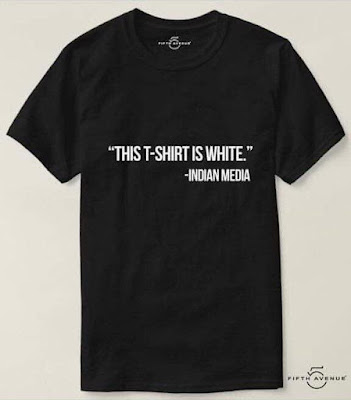Freedom of the press is dying
in Modi’s India rather quickly. The World Press Freedom Index ranks India very
low at 142 out of 180 countries. The rank deteriorated consistently from the
time Modi became the Prime Minister. The Press Council of India, a state-owned
body, accepts that there is unwarranted censorship of the media in the country.
There are various types of “intimidation” of journalists and news agencies.
Both human
rights and press freedom have crumbled in India faster than in any other
country. “Freedom of expression is a precondition for democracy and lasting
peace,” The Nobel Peace Prize Committee said while awarding the prize last year
to Maria Ressa and Dmitry Muratov “for their courageous fight for freedom of
expression in the Philippines and Russia.” The Committee went on to say that these
two are “representatives of all journalists who stand up for this ideal in a
world in which democracy and freedom of the press face increasingly adverse
conditions.” India has entered the watchlist of international observers of
democracy and press freedom.
Several
journalists in India have been subjected to various forms of harassment by the
government. Many faced intimidation including death and rape threats. Bobby
Ghosh, editor of the Hindustan Times had to resign when he opened a
portal called the Hate Tracker on the newspaper’s website. Hate Tracker was a
database for tracking violent crimes motivated by race, religion and sexual
orientation. It should be recalled that Ghosh resigned just after Modi visited
the owner of the newspaper.
Journalists
like Gauri Lankesh were brutally killed for reporting truths which were
supposedly antinational. At least 40 journalists were killed and 200 were
attacked between 2014 and 2019, according to a report.
The
new press accreditation policy ensures that more and more journalists will
face serious consequences if they report truths which are unpalatable for the
government. If a journalist “acts in manner which is prejudicial to the
sovereignty and integrity of India, the security of the state, friendly
relations with foreign states, public order, decency or morality or in relation
to contempt of court, defamation or incitement of an offence,” his/her
accreditation will be cancelled. The intent is crystal clear. And ominous too.
India Digital
News Report from the illustrious Reuters Institute says that the India media is
fast losing credibility. According to this report, only 38% of Indians trust
news now.
Recently a
Malayalam TV channel named Media One was shut down as the government refused to
renew its license. Reason: it gave to its viewers accurate reports about the
attacks on Muslims in Delhi in 2020. What is bizarre is that the High Court
quoted the Rig Veda to justify the government’s action against the channel.
Will we have the Vedas as our Constitution soon?


Hari Om
ReplyDeleteIt keeps happening, but all that is done is it is on 'watchlist'... and to quote from scripture in this case? Clear misuse and twisting of words yet again.
Oh a cheerful note - you have a new kitty!!! YAM xx
Our newspapers get 70% of their income from ads and government is the biggest advertiser. That's an added reason for appeasement coverage.
DeleteIt's an old pic. This one grew up and is mother of 4 kittens now.
When the judiciary has failed the citizens and a large section of press has opted for the servility of those in power (for the sake of material gains, survival in a competitive market or the like wise), what's the solution ? Who can play David for this Goliath (who, ironically, pretends to be David to fool the people) ?
ReplyDeleteHard times indeed. No David, only Goliath.
DeleteI'll be happy if all news channels - pro-left/pro-right/pro-center - are muted. Let's go back to newspaper era. Overdose!
ReplyDeleteThere's no going back. This is Kali Yug.
DeleteI thus get most of my news from newspapers and digital media, TV media is dead
ReplyDeleteEven newspapers are sold out. Most of them. There are just a very few exceptions and they are running at a loss or are just online ones.
Delete